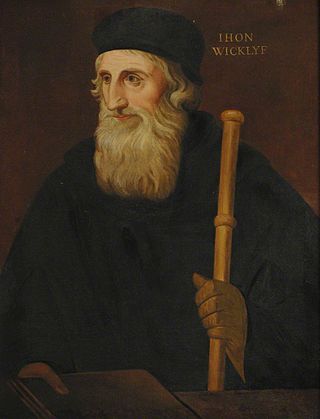Related Research Articles

John Wycliffe was an English scholastic philosopher, Christian reformer, Catholic priest, and a theology professor at the University of Oxford. Wycliffe is traditionally believed to have advocated or made a vernacular translation of the Vulgate Bible into Middle English, though more recent scholarship has minimalized the extent of his advocacy or involvement for lack of direct contemporary evidence.

Lollardy was a proto-Protestant Christian religious movement that was active in England from the mid-14th century until the 16th-century English Reformation. It was initially led by John Wycliffe, a Catholic theologian who was dismissed from the University of Oxford in 1381 for heresy. The Lollards' demands were primarily for reform of Western Christianity. They formulated their beliefs in the Twelve Conclusions of the Lollards. Early it became associated with uprisings and assassinations of high government officials, and was suppressed.

Simon Sudbury was Bishop of London from 1361 to 1375, Archbishop of Canterbury from 1375 until his death, and in the last year of his life Lord Chancellor of England. He met a violent death during the Peasants' Revolt in 1381.
Robert Winchelsey was an English Catholic theologian and Archbishop of Canterbury. He studied at the universities of Paris and Oxford, and later taught at both. Influenced by Thomas Aquinas, he was a scholastic theologian.
William Courtenay was Archbishop of Canterbury (1381–1396), having previously been Bishop of Hereford and Bishop of London.

Thomas Arundel was an English clergyman who served as Lord Chancellor and Archbishop of York during the reign of Richard II, as well as Archbishop of Canterbury in 1397 and from 1399 until his death, an outspoken opponent of the Lollards. He was instrumental in the usurpation of Richard by his cousin Henry Bolingbroke, who became Henry IV.

Wulfstan was an English Benedictine monk who served as Bishop of Worcester from 1062 to 1095. He was the last surviving pre-Conquest bishop. Wulfstan is a saint in the Western Christian churches.

Frederick Donald Coggan, Baron Coggan, was the 101st Archbishop of Canterbury from 1974 to 1980. As Archbishop of Canterbury, he "revived morale within the Church of England, opened a dialogue with Rome and supported women's ordination". He had previously been successively the Bishop of Bradford and the Archbishop of York.
John Purvey was an English preacher, reformer, and sometime disciple of John Wycliffe. He is popularly associated with the "Later Version" Middle English translations of at least the New Testament of the Middle English Bible popularly associated with Wycliffe.

Wycliffe's Bible is a sequence of orthodox Middle English Bible translations from the Latin Vulgate which appeared over a period from approximately 1382 to 1395.
Cuthbert was a medieval Anglo-Saxon Archbishop of Canterbury in England. Prior to his elevation to Canterbury, he was abbot of a monastic house, and perhaps may have been Bishop of Hereford also, but evidence for his holding Hereford mainly dates from after the Norman Conquest of England in 1066. While Archbishop, he held church councils and built a new church in Canterbury. It was during Cuthbert's archbishopric that the Diocese of York was raised to an archbishopric. Cuthbert died in 760 and was later regarded as a saint.
Hugh Curwen was an English ecclesiastic and statesman, who served as Archbishop of Dublin and Lord Chancellor of Ireland from 1555 to 1567, then as Bishop of Oxford until his death in November 1568.

Hilary was a medieval bishop of Chichester in England. English by birth, he studied canon law and worked in Rome as a papal clerk. During his time there, he became acquainted with a number of ecclesiastics, including the future Pope Adrian IV, and the writer John of Salisbury. In England, he served as a clerk for Henry of Blois, who was the bishop of Winchester and brother of King Stephen of England. After Hilary's unsuccessful nomination to become Archbishop of York, Pope Eugene III compensated him by promoting him to the bishopric of Chichester in 1147.
Ralph of Maidstone was a medieval Bishop of Hereford.
Events from the 1380s in England.
The Earthquake Synod was an English synod that took place on 21 May 1382 in the Blackfriars area of London, England.
Henry Crumpe (fl.1380–1401) was Anglo-Irish Cistercian.

The 14th century saw major developments in Christianity, including the Western Schism, the decline of the Crusades, and the appearance of precursors to Protestantism.
John Aston or Ashton, was one of John Wycliffe's earliest followers.

Henry Knighton was an Augustinian canon at the abbey of St Mary of the Meadows, Leicester, England, and an ecclesiastical historian (chronicler). He wrote a history of England from the Norman conquest until 1396, thought to be the year he died.
References
- ↑ Wood, Anthony (1790). "Fasti Oxonienses". The History and Antiquities of the Colleges and Halls in the University of Oxford. p. 31 – via Internet Archive.
- ↑ Hibbert, Christopher, ed. (1988). "Appendix 5: Chancellors of the University". The Encyclopaedia of Oxford . Macmillan. pp. 521–522. ISBN 0-333-39917-X.
- 1 2 "Nicholas of Hereford". Encyclopædia Britannica . 28 March 2024.
- ↑ web.archive.org
- ↑ "Nicholas Hereford", The Cambridge History of English and American Literature, Volume II. The End of the Middle Ages